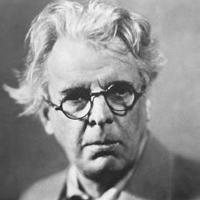Leda and the Swan by William Butler Yeats: Summary
The poem Leda and the Swan by William Butler Yeats shows how Leda was being raped by Zeus in the form of a wild swan and how this copulation led to the destruction of the city of the Troy. Zeus who is known to be a very wise god, one day infatuated by her beauty after seeing naked body while she was bathing in the river Furatos and raped her.

William B. Yeats (1865-1939)
The poem begins dramatically as it describes a dramatic event. "A Sudden blow" is received by a girl bathing in the river. We see the events from her perspective. She staggers as the swan climbs on her, holding her nape and caressing her thighs. Then he "holds her helpless breast upon his breast." Contemplating (thinking) this situation, the poet wonders how she could resist the assault. He asks how Leda's body could help not feeling the heart or emotion of the swan. These questions are rhetorical, as when we say "who would believe such a thing?" The young girl surrendered to her own emotion and the swan conveniently raped her. This was destined (fixed) by fate.
After the description and meditation about the rape in the octave, the poet makes a claim that the conception was the seed of destruction and not of knowledge and wisdom. The octave was split in two stanzas; the sestet is broken in its third line. The first part of the sestet is the claim related to the theme of history, and the rhetorical question in the last fragment supports the theme indirectly.' The ejaculation and conception of Helen and Clytemnestra (her sister) was also the conception of the destructive civilization symbolized by the broken wall and burning tower of the city Troy in the Trojan War. The war was fought for Helen. Clytemnestra killed her husband Agamemnon herself. With the mention of the broken wall and the turning point of history, the stanza is also broken in the middle of the third line.
Leda was completely 'caught up' and 'mastered' by the "brute blood of the air." The intercourse was physical, violent and emotional. Obviously, she did not conceive a spiritual being as Virgin Mary conceived Jesus Christ. Moreover, she did not herself gain any divine wisdom. She didn't gain any knowledge about the future. The question "Did she put on his knowledge with his power?" is rhetorical. No, she did not. The "indifferent" beak let go of her; even the swan is a 'means' in the inevitable events of history. It is beyond anyone's control.
Cite this Page!
Sharma, K.N. "Leda and the Swan by William Butler Yeats: Summary." BachelorandMaster, 23 Nov 2013, bachelorandmaster.com/britishandamericanpoetry/leda-and-swan.html.
Related Topics
Leda and the Swan: Introduction
The Scholars: Critical Analysis
Sailing to Byzantium: Analysis
The Theme of Immortality in Byzantium Poems
A Prayer for My Daughter: Analysis
Among School Children: Analysis
Crazy Jane Talks with the Bishop
The Lamentation of the Old Pensioner
He Wishes for the Clothes of Heaven
An Irish Airman Foresees his Death
When You Are Old: Summary and Analysis
William Butler Yeats as a Symbolist
Truth of Human Life in Yeats's Poetry
Yeats and the Romantic Tradition
The Salient Features of Yeats's Poetry
Biography of William Butler Yeats
 |
bachelorandmaster.com |